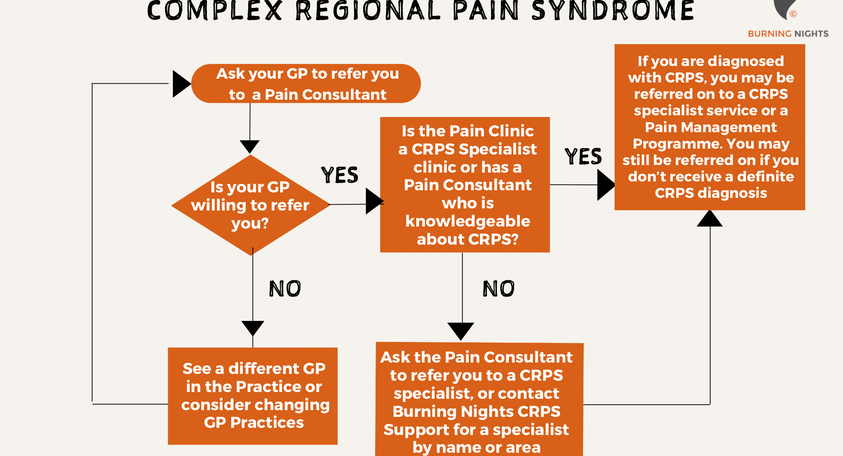We use cookies to improve your experience. By accepting you agree to our cookie policy

Complex Regional Pain Syndrome (CRPS), formerly known as Reflex Sympathetic Dystrophy (RSD), is a chronic and often debilitating condition that primarily affects a limb after an injury. CRPS is characterised by prolonged pain that is disproportionate to the initial injury and may spread beyond the original site.
To learn more about Complex Regional Pain Syndrome, click here.
The condition can manifest through a range of symptoms, including sensory disturbances, motor dysfunction, autonomic irregularities (such as abnormal sweating or temperature changes), and skin and bone abnormalities. CRPS is not caused by psychological factors, though it can lead to significant psychological distress due to the chronic nature of the pain.
The pain experienced in CRPS is typically out of proportion to the original injury and can be accompanied by swelling, changes in skin colour, temperature sensitivity, and even psychological challenges due to the persistent and severe nature of the symptoms. The condition usually begins in one area, such as a limb, but it can spread to other parts of the body over time.
Early diagnosis and treatment are critical in managing CRPS effectively. Understanding and recognising the symptoms early can lead to better outcomes and help prevent the condition from worsening.
Complex Regional Pain Syndrome (CRPS) is a difficult condition to diagnose, yet research shows that the earlier the diagnosis is made, the better the prognosis.
You may be experiencing some or all of the symptoms as per the diagnostic criteria for CRPS - the Budapest Criteria, so it is important to get your symptoms assessed as soon as possible.
Take a look at this flowchart diagram to help you understand how to your symptoms assessed for Complex Regional Pain Syndrome (CRPS).

You may be experiencing some or all of the symptoms outlined in the Budapest Criteria, the primary diagnostic tool for identifying CRPS. Established in 2004 during the International Consensus Conference, the Budapest Criteria replaced the older guidelines from the International Association for the Study of Pain (IASP) and provides a structured approach to diagnosing CRPS accurately.
To receive a positive CRPS diagnosis using the Budapest Criteria, a doctor will assess your symptoms against specific categories. These include ongoing pain that is disproportionate to the initial injury or illness, and additional signs such as sensory disturbances, vasomotor changes (like temperature or skin colour differences), sudomotor or oedema (swelling and sweating abnormalities), and motor or trophic changes (such as reduced range of motion, tremors, or changes in skin, hair, and nails).
For a clinical diagnosis, at least one symptom from three of these categories must be reported by the patient, and the doctor must observe at least one sign in two or more of these categories during the examination. Diagnostic tools such as bone scans, thermal studies, or MRI may also be used to support the diagnosis. The precision of the Budapest Criteria helps ensure that CRPS is correctly identified, which is vital for receiving appropriate treatment and avoiding misdiagnosis.
Catching CRPS early is crucial. The sooner you recognise the symptoms, the better your chances of managing the condition effectively. When diagnosed early, treatments are more likely to work well, helping to control pain and prevent the condition from getting worse.
CRPS can be a tough and complex condition, but with prompt attention, you can improve your quality of life and avoid more severe symptoms. So, if you notice anything unusual, speak to a healthcare professional as soon as possible - early action really can make all the difference.
We use cookies to improve your experience. By accepting you agree to our cookie policy
 £
£